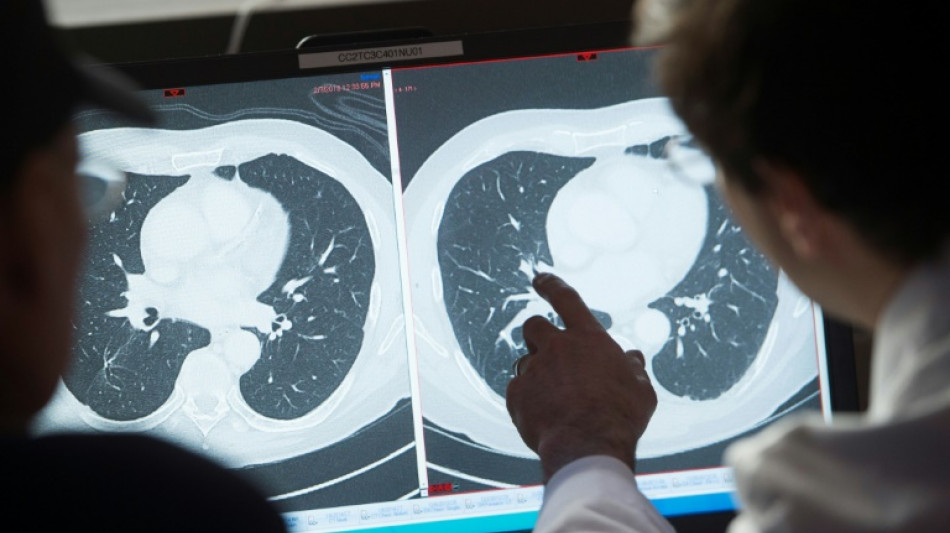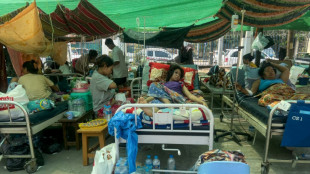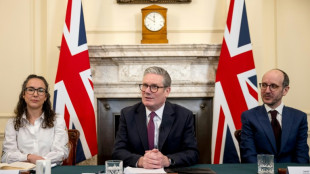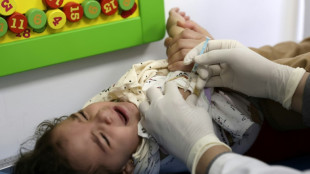
-
 China property giant Vanke reports annual loss of $6.8 bn
China property giant Vanke reports annual loss of $6.8 bn
-
World economies brace for Trump tariffs ahead of deadline

-
 Myanmar declares week of mourning as quake toll passes 2,000
Myanmar declares week of mourning as quake toll passes 2,000
-
Japan leads hefty global stock market losses on tariff fears

-
 Yes, oui, Cannes! Glamour name eyes place in French Cup final
Yes, oui, Cannes! Glamour name eyes place in French Cup final
-
'Different energy' at Man Utd after mini-revival, says Amorim

-
 Fear of aftershocks in Myanmar forces patients into hospital car park
Fear of aftershocks in Myanmar forces patients into hospital car park
-
Far-right leaders rally around France's Le Pen after election ban

-
 Renault and Nissan shift gears on alliance
Renault and Nissan shift gears on alliance
-
Hard-hitting drama 'Adolescence' to be shown in UK schools

-
 Primark boss resigns after inappropriate behaviour allegation
Primark boss resigns after inappropriate behaviour allegation
-
Myanmar declares week of mourning as quake toll passes 2,000, hopes fade for survivors

-
 Mbappe can be Real Madrid 'legend' like Ronaldo: Ancelotti
Mbappe can be Real Madrid 'legend' like Ronaldo: Ancelotti
-
Saka 'ready to go' for Arsenal after long injury lay-off: Arteta

-
 Aston Martin to sell stake in Formula One team
Aston Martin to sell stake in Formula One team
-
Three talking points ahead of clay-court season

-
 French court hands Le Pen five-year election ban
French court hands Le Pen five-year election ban
-
Probe accuses ex J-pop star Nakai of sexual assault

-
 Japan leads hefty global stock market losses on tariff woes
Japan leads hefty global stock market losses on tariff woes
-
Saka 'ready to go' after long injury lay-off: Arteta

-
 Ingebrigtsen Sr, on trial for abusing Olympic champion, says he was 'overly protective'
Ingebrigtsen Sr, on trial for abusing Olympic champion, says he was 'overly protective'
-
Tourists and locals enjoy 'ephemeral' Tokyo cherry blossoms

-
 Khamenei warns of 'strong' response if Iran attacked
Khamenei warns of 'strong' response if Iran attacked
-
France fines Apple 150 million euros over privacy feature

-
 UK PM urges nations to smash migrant smuggling gangs 'once and for all'
UK PM urges nations to smash migrant smuggling gangs 'once and for all'
-
Thai authorities probe collapse at quake-hit construction site

-
 France's Le Pen convicted in fake jobs trial
France's Le Pen convicted in fake jobs trial
-
Chinese tech giant Huawei says profits fell 28% last year

-
 Trump says confident of TikTok deal before deadline
Trump says confident of TikTok deal before deadline
-
Myanmar declares week of mourning as hopes fade for quake survivors

-
 Japan's Nikkei leads hefty market losses, gold hits record
Japan's Nikkei leads hefty market losses, gold hits record
-
Tears in Taiwan for relatives hit by Myanmar quake

-
 Venezuela says US revoked transnational oil, gas company licenses
Venezuela says US revoked transnational oil, gas company licenses
-
'Devastated': Relatives await news from Bangkok building collapse

-
 Arsenal, Tottenham to play pre-season North London derby in Hong Kong
Arsenal, Tottenham to play pre-season North London derby in Hong Kong
-
Japan's Nikkei leads hefty equity market losses; gold hits record

-
 Israel's Netanyahu picks new security chief, defying legal challenge
Israel's Netanyahu picks new security chief, defying legal challenge
-
Trump says US tariffs to hit 'all countries'

-
 Prayers and tears for Eid in quake-hit Mandalay
Prayers and tears for Eid in quake-hit Mandalay
-
After flops, movie industry targets fresh start at CinemaCon

-
 Tsunoda targets podium finish in Japan after 'unreal' Red Bull move
Tsunoda targets podium finish in Japan after 'unreal' Red Bull move
-
French chefs await new Michelin guide

-
 UK imposes travel permit on Europeans from Wednesday
UK imposes travel permit on Europeans from Wednesday
-
At his academy, Romanian legend Hagi shapes future champions

-
 Referee's lunch break saved Miami winner Mensik from early exit
Referee's lunch break saved Miami winner Mensik from early exit
-
Djokovic refuses to discuss eye ailment after shock Miami loss

-
 Mitchell magic as Cavs bag 60th win, Pistons and T'Wolves brawl
Mitchell magic as Cavs bag 60th win, Pistons and T'Wolves brawl
-
Mensik shocks Djokovic to win Miami Open

-
 Duterte lawyer: 'compelling' grounds to throw case out
Duterte lawyer: 'compelling' grounds to throw case out
-
What happens on Trump's 'Liberation Day' and beyond?

| RYCEF | -2.59% | 9.66 | $ | |
| CMSC | -0.21% | 22.415 | $ | |
| RBGPF | 1.47% | 68 | $ | |
| GSK | -1.77% | 38.065 | $ | |
| SCS | 0.27% | 11.13 | $ | |
| BCC | -0.66% | 97.655 | $ | |
| NGG | -0.06% | 65.53 | $ | |
| RIO | -2.74% | 59.4 | $ | |
| VOD | -0.69% | 9.385 | $ | |
| RELX | -0.08% | 50.12 | $ | |
| AZN | -1.71% | 72.55 | $ | |
| JRI | 0.46% | 12.93 | $ | |
| CMSD | -0.31% | 22.64 | $ | |
| BTI | 1.52% | 41.135 | $ | |
| BCE | 1.1% | 23.225 | $ | |
| BP | 0.37% | 33.985 | $ |

Higher cost of US cancer care doesn't improve survival rates: study
The United States spends twice as much on cancer care as the average high-income country, but gets only middle-of-the-table survival results, a study said Friday.
The results were published in the Journal of the American Health Association (JAMA) Health Forum.
"There is a common perception that the US offers the most advanced cancer care in the world," said lead author Ryan Chow, who is pursuing a medical degree and PhD at Yale University, in a statement.
America is touted for developing advanced new treatments and approving them faster than other countries, and the team were curious about whether this translated into better outcomes.
Out of 22 high-income countries, the United States was found to have by far the highest spending rate: it spends $200 billion per year on cancer care, or roughly $600 per capita, compared to the average of $300 per capita in high-income countries.
But the researchers found this additional spending did not translate into better population-level cancer mortality rates.
"In other words, countries that spend more on cancer care do not necessarily have better cancer outcomes," said Chow.
The US was only slightly better than average, while six countries -- Australia, Finland, Iceland, Japan, South Korea, and Switzerland -- had both better outcomes and lower spending.
Of the countries examined, South Korea and Japan had the lowest cancer mortality rates, while Denmark had the highest, followed by France.
Smoking is the biggest driver of cancer deaths, a factor expected to make cancer outcomes appear more favorable in countries with traditionally low smoking rates such as the US.
After controlling for smoking rates, they found the US was exactly in the middle. Nine countries -- Australia, Finland, Iceland, Japan, Korea, Luxembourg, Norway, Spain, and Switzerland — had lower smoking-adjusted cancer mortality.
There are a constellation of factors behind surging costs in the US, the team wrote.
Cancer drug expenditures account for 37 percent of privately insured US cancer expenditure, and these drugs cost far more in the US than other countries.
Unlike countries with public health systems, US state-run insurance called Medicaid cannot negotiate drug prices.
Additionally, the US Food and Drug Administration (FDA) does not consider pricing when evaluating drug approvals, unlike other countries such as Britain where cost-effectiveness must be factored.
Much of the growth in drug spending has been attributed to newer types of drugs such as monoclonal antibodies, kinase inhibitors, and immune checkpoint inhibitors, even though the evidence in their favor is often marginal.
Finally, medical care is also more aggressive in the US: "Within the last six months of life, US patients with cancer are admitted to the intensive care unit at twice the rate of other countries and are more likely to receive chemotherapy," the team wrote.
Specialty societies advocate for more screening than guidelines suggest, further increasing costs, and low-risk tumors, such as early-stage prostate cancers, are more often subject to intervention despite evidence they would unlikely cause harm if untreated.
"Other countries and systems have much to teach the US if we could be open to change," said co-author Elizabeth Bradley, president of Vassar College.
M.Fischer--AMWN



